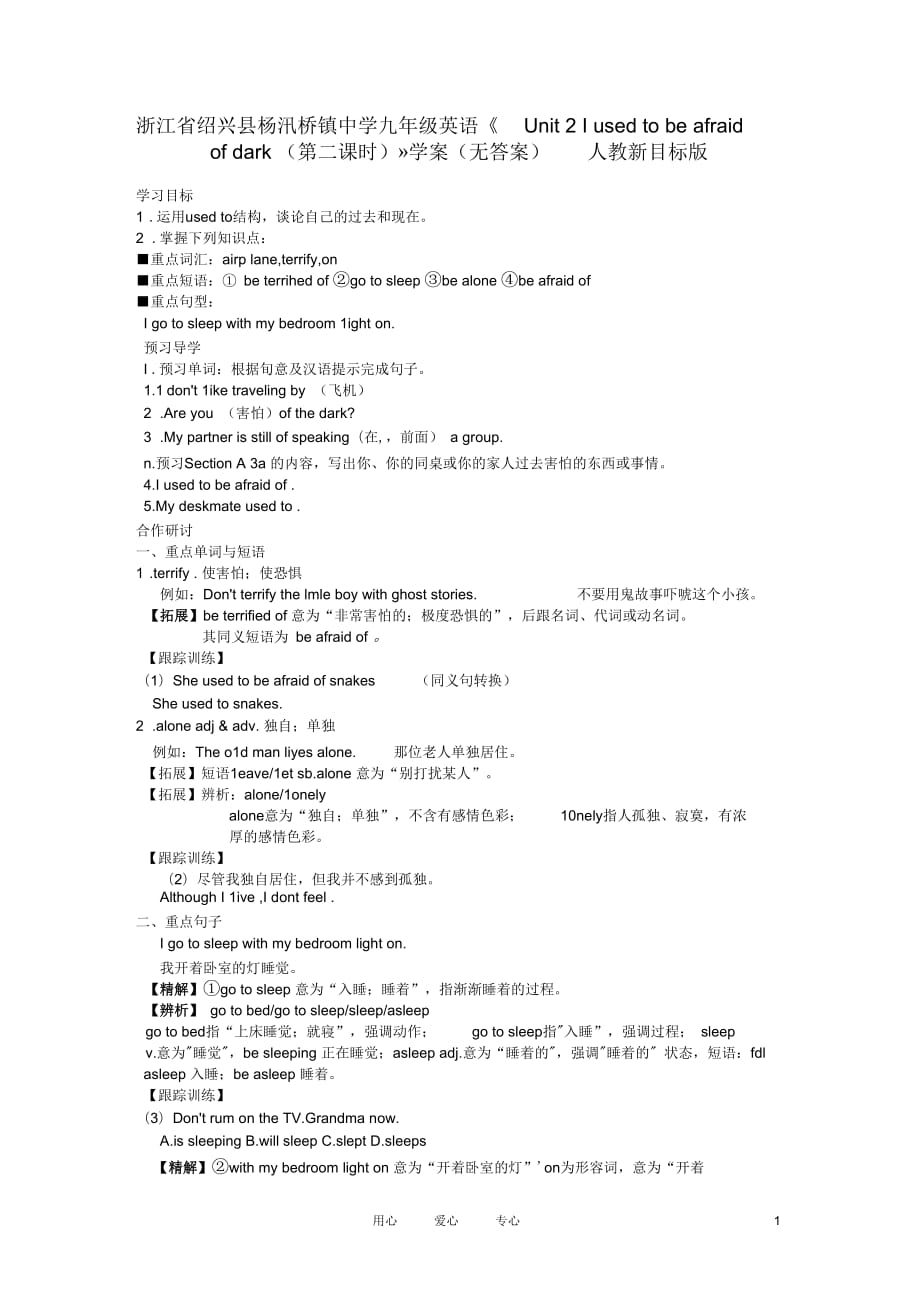《浙江省紹興縣楊汛橋鎮(zhèn)中學(xué)九年級(jí)英語(yǔ)《Unit2Iusedtobeafraidofdark(第二課時(shí))》學(xué)案(無(wú)答案)》由會(huì)員分享�,可在線閱讀�,更多相關(guān)《浙江省紹興縣楊汛橋鎮(zhèn)中學(xué)九年級(jí)英語(yǔ)《Unit2Iusedtobeafraidofdark(第二課時(shí))》學(xué)案(無(wú)答案)(4頁(yè)珍藏版)》請(qǐng)?jiān)谘b配圖網(wǎng)上搜索。
1�、浙江省紹興縣楊汛橋鎮(zhèn)中學(xué)九年級(jí)英語(yǔ)《 Unit 2 I used to be afraid
of dark (第二課時(shí))學(xué)案(無(wú)答案) 人教新目標(biāo)版
學(xué)習(xí)目標(biāo)
1 .運(yùn)用used to結(jié)構(gòu),談?wù)撟约旱倪^(guò)去和現(xiàn)在��。
2 .掌握下列知識(shí)點(diǎn):
■重點(diǎn)詞匯:airp lane,terrify,on
■重點(diǎn)短語(yǔ):① be terrihed of ②go to sleep ③be alone ④be afraid of
■重點(diǎn)句型:
I go to sleep with my bedroom 1ight on.
預(yù)習(xí)導(dǎo)學(xué)
I .預(yù)習(xí)單詞:根據(jù)旬意及漢語(yǔ)提示完成句子�����。
1.1 dont
2���、 1ike traveling by (飛機(jī))
2 .Are you (害怕)of the dark?
3 .My partner is still of speaking(在,,前面) a group.
n.預(yù)習(xí)Section A 3a 的內(nèi)容,寫出你��、你的同桌或你的家人過(guò)去害怕的東西或事情�����。
4.I used to be afraid of .
5.My deskmate used to .
合作研討
一、重點(diǎn)單詞與短語(yǔ)
1 .terrify . 使害怕�;使恐懼
例如:Dont terrify the lmle boy with ghost stories. 不要用鬼
3�����、故事嚇唬這個(gè)小孩�。
【拓展】be terrified of 意為“非常害怕的;極度恐懼的”�����,后跟名詞���、代詞或動(dòng)名詞。 其同義短語(yǔ)為 be afraid of ��。
【跟蹤訓(xùn)練】
(1)She used to be afraid of snakes (同義句轉(zhuǎn)換)
She used to snakes.
2 .alone adj & adv. 獨(dú)自��;單獨(dú)
例如:The o1d man liyes alone. 那位老人單獨(dú)居住���。
【拓展】短語(yǔ)1eave/1et sb.alone 意為“別打擾某人”�����。
【拓展】辨析:alone/1onely
alone意為“獨(dú)自�;單獨(dú)”��,不含有感情
4���、色彩; 10nely指人孤獨(dú)�、寂寞,有濃
厚的感情色彩���。
【跟蹤訓(xùn)練】
(2)盡管我獨(dú)自居住��,但我并不感到孤獨(dú)�。
Although I 1ive ,I dont feel .
二�����、重點(diǎn)句子
I go to sleep with my bedroom light on.
我開(kāi)著臥室的燈睡覺(jué)�。
【精解】①go to sleep 意為“入睡;睡著”���,指漸漸睡著的過(guò)程���。
【辨析】 go to bed/go to sleep/sleep/asleep
go to bed指“上床睡覺(jué)���;就寢”,強(qiáng)調(diào)動(dòng)作���; go to sleep指"入睡”�,強(qiáng)調(diào)過(guò)程�; sleep
v.意為"睡覺(jué)",be
5���、 sleeping 正在睡覺(jué)�;asleep adj.意為“睡著的"��,強(qiáng)調(diào)"睡著的" 狀態(tài)�,短語(yǔ):fdl asleep 入睡;be asleep 睡著�����。
【跟蹤訓(xùn)練】
(3)Dont rum on the TV.Grandma now.
A.is sleeping B.will sleep C.slept D.sleeps
【精解】②with my bedroom light on 意為“開(kāi)著臥室的燈”on為形容詞��,意為“開(kāi)著 的�;接通的;工作著的”�。�
【拓展】turn on 打開(kāi)(電器、電源等)���;on TV通過(guò)電視��;on the swim team 在游泳隊(duì);
on Monday
6�、 morning 在星期一早上
【跟蹤訓(xùn)練】
(4)房間的燈亮著�,我想他可能在家。
The light is in the room.I think he might be at home.
【拓展】“with+名詞+介詞/形容詞”結(jié)構(gòu)�,在句中作狀語(yǔ),表示伴隨狀況���。
【跟蹤訓(xùn)練】
(5)夏天我喜歡開(kāi)著窗子睡覺(jué)��。
I like to sle ep the window in summer.
(6)老師手里拿著一本書走進(jìn)了教室�����。
My teacher went into the clas sroom a book his hand.
當(dāng)堂檢測(cè)
I .根據(jù)旬意及首字母提示完成單
7�、詞
1 .He u to be late for schoo1 , didnt he?
2 .Little Tom is very i in science.
3 .You 1ike music.What about (she) ?
n.用所給單詞的適當(dāng)形式填空
4 .Hes afra (swim) in the river.
5 .Lucy was tterrify ) by what I said jus .t now.
6 .Are you afraid of (be) alone?
m .根據(jù)漢語(yǔ)提示完成句���? �,
7 .他以前經(jīng)常在電視上觀看 NBA比賽。
8��、
He used to NBA games .
8 .我喜歡開(kāi)著臥室的燈睡覺(jué)�。
I 1ike to sleep my bedroom light .
9 .你過(guò)去常常留長(zhǎng)發(fā)口「
you to have long hair?
10 .Larry現(xiàn)在仍然害怕在眾人面前說(shuō)話。
Larry is still speaking in iront of a group 課后練習(xí)
I .單項(xiàng)選擇
( )1.I dont 1ike to go to sleep the 1ight on.
A.in B.to C.with D.and
mistakes.
his schoo1 te
9���、am.
( )2.My teacher often tells us not to be afraid of
A.do B.doing C.make D.making
( )3.His brother is good at football , and he is
A.at B.in C.on D.of
( ■) 4.I used to late , but nom I am used to early.
A.get up ; get up B.get up ; getting up
,arent
;lonely
C.getting up ; get up D.getting
10���、 up ; getting up
( )5. —Oh, Steve.Overhere.Dont yon remember me? —.Yonre Paula
you?
A.Yes, I didnt B.Yes , I do C.NO , I do D.NO , I did
( )6.The o1d man 1ives , but h e never feels .
A.alone ; a1one B.lonely ; 1onely C.1onely ; a1one D.alone ( )7.DaVid hardly has time for party , he?
A.dont B
11、.doesnt C.does D.do
( )8.Today computers in both cities and town s.
Awere using B.are used C.were used D.are using
( )9.Mrs White a reporter.She has retired.
A.used to be B.uses to be C.is used to be D.used to
( )10.We in this pool when we were young , but now is fish.
A.are used to Swim ; use
12�����、d to B.are used to swimming ; is used to keep
C.used to swinn ; used t o keep D.used to swim ; is used for keeping n.用所給單詞的適當(dāng)形式填空
Mr Turner used 11 (go)hshing in the countryside every week.It was his favorite
sport.He often fished for several hours without 12 (catch ) anything at a11. .But
this
13�����、didnt worry him.He always we nt with an empty bag. "You must give up 13
(fish ), " his friends said. "Its a waste of time. " B But they dont realize onet hing.I only enjoy 14 (sit ) in a boat and doing nothing at a11.Fishing can make
me 15 (forget ) the noise of the city and 1ive quietly for some
14�����、time. "He always
said to himself.
11 . 12. 13. 14. 15. 出.閱讀理解
I used to travel by air a great deal when I was a boy.My parents used to 1ive in Sourh America and I used to fly there from Europe in the ho1idays.A flight attendant Would take charge of me and I never had an unpleasant experience.
15�、1 am used to traveling by air and only on one occasion have I ever felt frightened.After taking off , we were flying low over the city and slowly gaining height,when the plane suddenly turned round and flew back to the airport. While we were waiting to land , aflight attendant to1d us to keep calm a
16���、nd to get off the plane quickly as soon as it had touched down.Eve-ryone on board was worried and we were curious to find out what had happened.Later we learnt that there was a vety im-portant people on board.The po1ice had been to1d that a bomb had been planted on the plane.After we had 1anded , th
17��、e plane was searched thoroughly (徹底地).Fortunately , nothing was
found and five hours 1ater we rere able to take off again.
根據(jù)短文內(nèi)容�,判斷正(T)誤(F)
12 )16.The writer used to take the bus when he was a boy.
13 )17.The writers parents used to 1ive in South Afdca.
14 )18.While they were waiting to 1and , an airhostess to1d them to be calna.
15 )19.Nothing was found and nine hours later they could take off again.
16 )20.There was really a bomb on the plane.
17
18
用心 愛(ài)心 專心 4
 浙江省紹興縣楊汛橋鎮(zhèn)中學(xué)九年級(jí)英語(yǔ)《Unit2Iusedtobeafraidofdark(第二課時(shí))》學(xué)案(無(wú)答案)
浙江省紹興縣楊汛橋鎮(zhèn)中學(xué)九年級(jí)英語(yǔ)《Unit2Iusedtobeafraidofdark(第二課時(shí))》學(xué)案(無(wú)答案)

